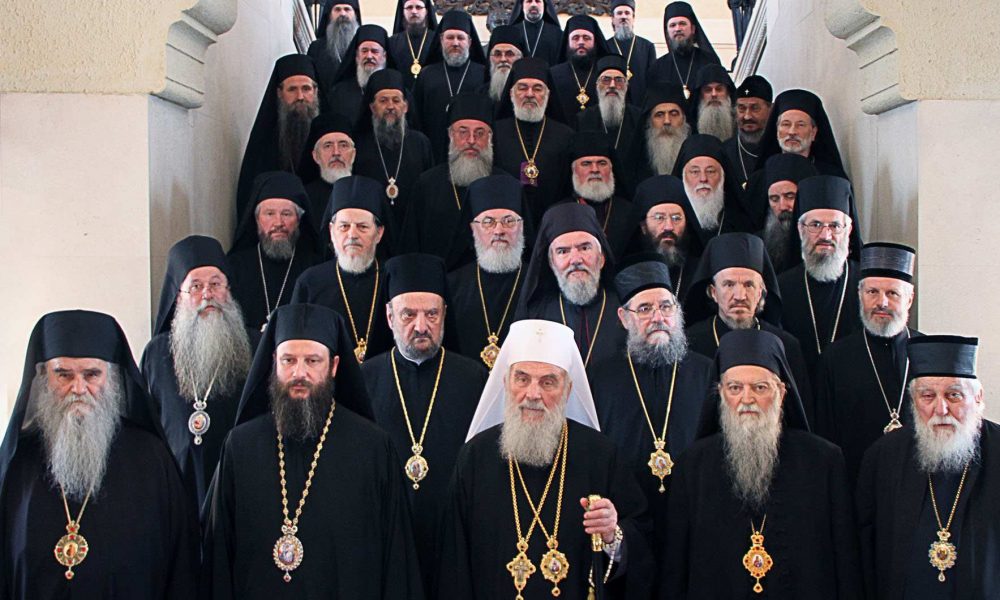
SERBIAN CHURCH REPORTEDLY BEWILDERED BY DECISION OF BULGARIAN CHURCH REGARDING MACEDONIAN CHURCH

Photo: chaniapost.eu
Orthochristian.com – 14/12/17
His Holiness Patriarch Irinej of Serbia has reportedly expressed his bewilderment at the Bulgarian Orthodox Church’s (BOC) decision to present the case for the canonicity and autocephaly of the schismatic Macedonian Orthodox Church (MOC) to the other canonical Local Orthodox Churches. The decision has caused anxiety among the Serbian hierarchy, according to the Bulgarian site 24 Hours, citing the Serbian newspaper Politika.
Having carefully considered the chronology of events in the relations between the BOC and MOC, and the recent decision of the Bulgarian Holy Synod, the Serbian Synod has expressed its concern about that decision.
The MOC asked the Bulgarian Church in November to establish “Eucharistic communion with the renewed Ohrid Archbishopric,” asking that that the Macedonian Church be recognized as autocephalous.
Having examined the letter of Archbishop Stephan of the MOC, the Bulgarian Synod resolved that, inasmuch as the MOC has expressed its willingness and desire to accept the BOC as its Mother Church, the BOC is prepared to take on the sacred duty of interceding and advocating for the MOC with the other Local Orthodox Churches throughout the world, taking every necessary step to establish its canonicity.
According to the Serbian newspaper, the Holy Synod of the Serbian Orthodox Church (SOC) held a regular session on November 27 in which it discussed the matter, stating that it “was surprised by the decision of the Bulgarian Patriarchate” and that they “hope that the Synod in Sofia will adhere to the canonical order, given that the Archbishopric of Ohrid, headed by Archbishop Jovan (Vraniskovski) is the legitimate canonical Church in Macedonia, and this is acknowledged even by the European Court of Human Rights.”
The Orthodox Ohrid Archbishopric under Abp. Jovan separated from the MOC in 2002 to seek reunification with the Serbian Church. His Eminence was then imprisoned for many years on trumped-up charges of “inciting national, racial and religious hatred, schism and intolerance.” At times he was placed in solitary confinement, and he was allowed few visitors from the Serbian Orthodox Church. He was released from prison on February 2, 2015, although new proceedings against him began soon afterwards.
Citing an unnamed source, Politika notes that the Ohrid Archbishopric was approved by the Serbian Patriarchate’s autonomy act which was signed by Serbian Patriarch Pavle on behalf of the entire Church, and which was confirmed by a decision of the Ecumenical Patriarchate. According to a 2002 agreement reached in the southern Serbian city of Niš, the bishops of the MOC agreed to return to canonical unity with the SOC, but after returning to Macedonia they reversed their decision.
Explaining the MOC’s appeal to the BOC, historian Alexander Rakovic of the Institute for Contemporary Serbian History argues that politics have influenced the matter. “The formation of the government of Zoran Zaev in Skopje has led to a revival of Bulgariophile currents in all structures of Macedonian society, including in the Macedonian Orthodox Church,” the historian explained.
Rankovic also added his opinion that the course of the BOC is contrary to the canons, immature, and incapable of healing the split with the MOC, as it has no right to represent the MOC, given that it actually schismed from the SOC. Thus, the BOC’s involvement is seen by some as a mere interference in the SOC’s affairs.
The Politika paper also notes that Bulgaria will take over the chairmanship of the European Union on January 1, and thus Skopje is hoping to begin negotiations towards joining the European Union.
